Our Library
Explore our publications, from research papers and series to educational materials, covering all aspects of conflict transformation and peace promotion.
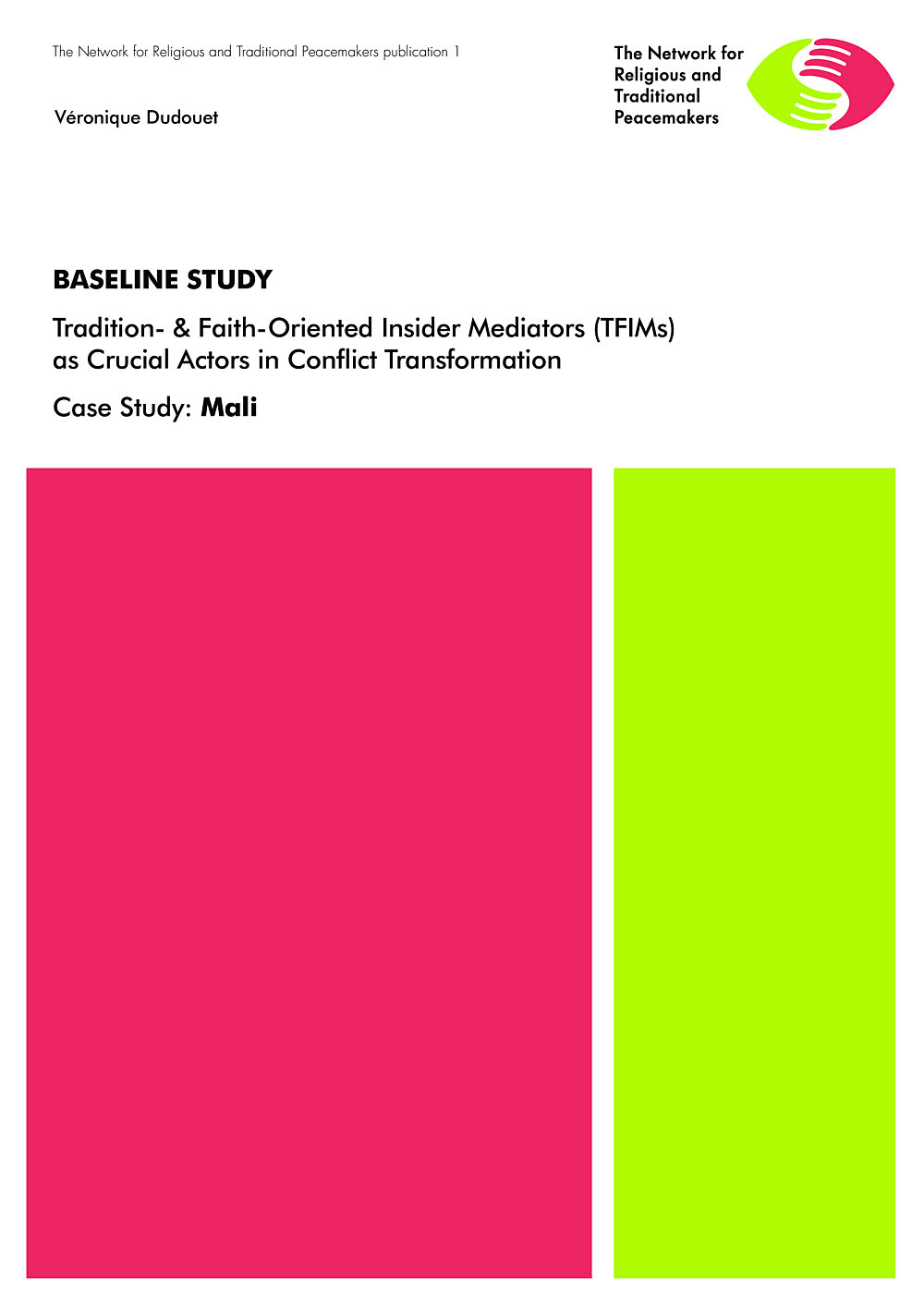
Tradition- & Faith-Oriented Insider Mediators (TFIMs) as Crucial Actors in Conflict TransformationCase Study: Mali
This case study on tradition- and faith- oriented insider mediators (TFIMs) in Mali has been produced using both existing knowledge on insider mediators and tradition- and faith-oriented local peacebuilding, and original data acquired through field studies.
- Year2016
- Author(s)Véronique Dudouet
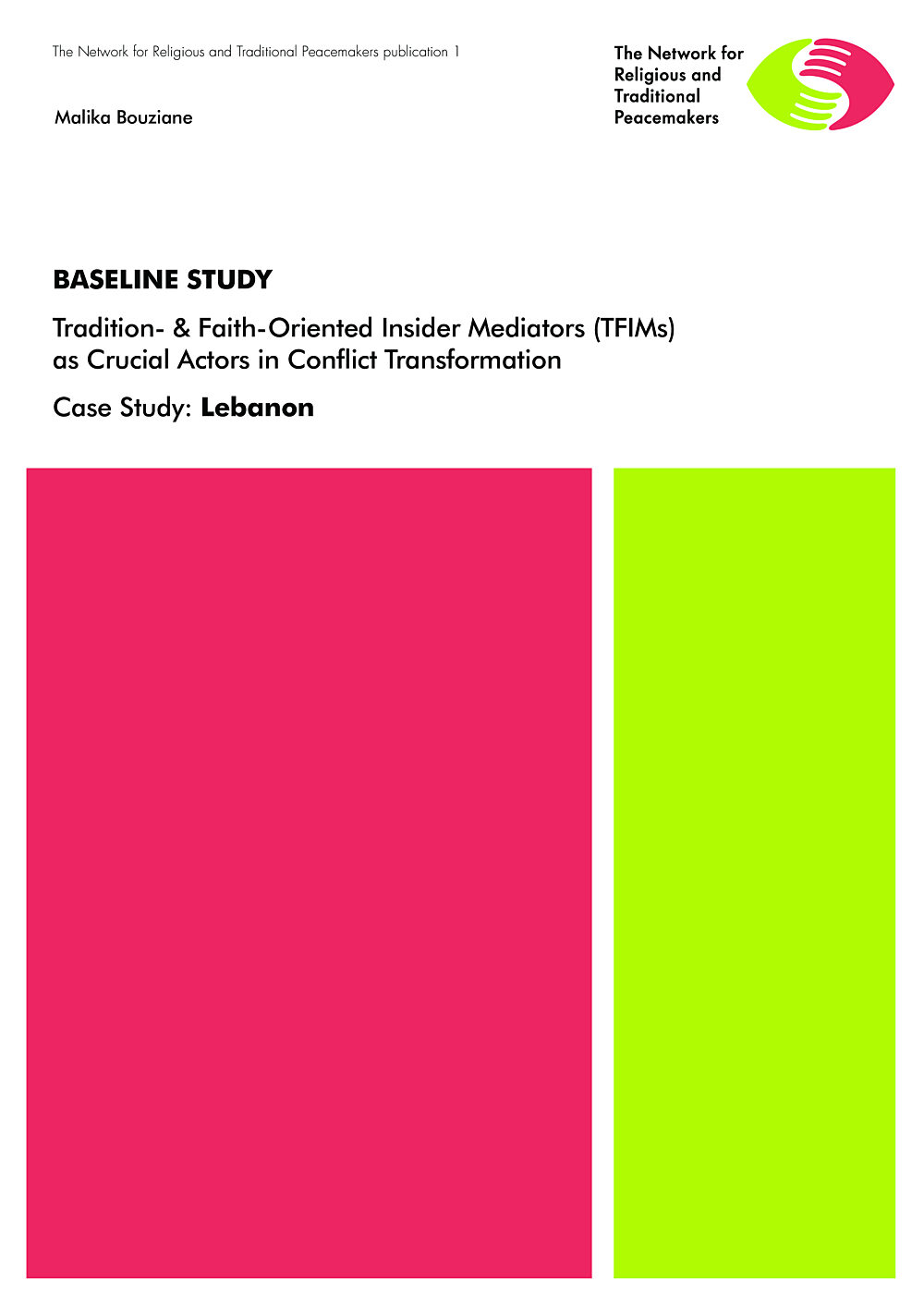
Tradition- & Faith-Oriented Insider Mediators (TFIMs) as Crucial Actors in Conflict TransformationCase Study: Lebanon
This case study on tradition- and faith- oriented insider mediators (TFIMs) in Lebanon has been produced using both existing knowledge on insider mediators and tradition- and faith-oriented local peacebuilding, and original data acquired through field studies.
- Year2016
- Author(s)Malika Bouziane
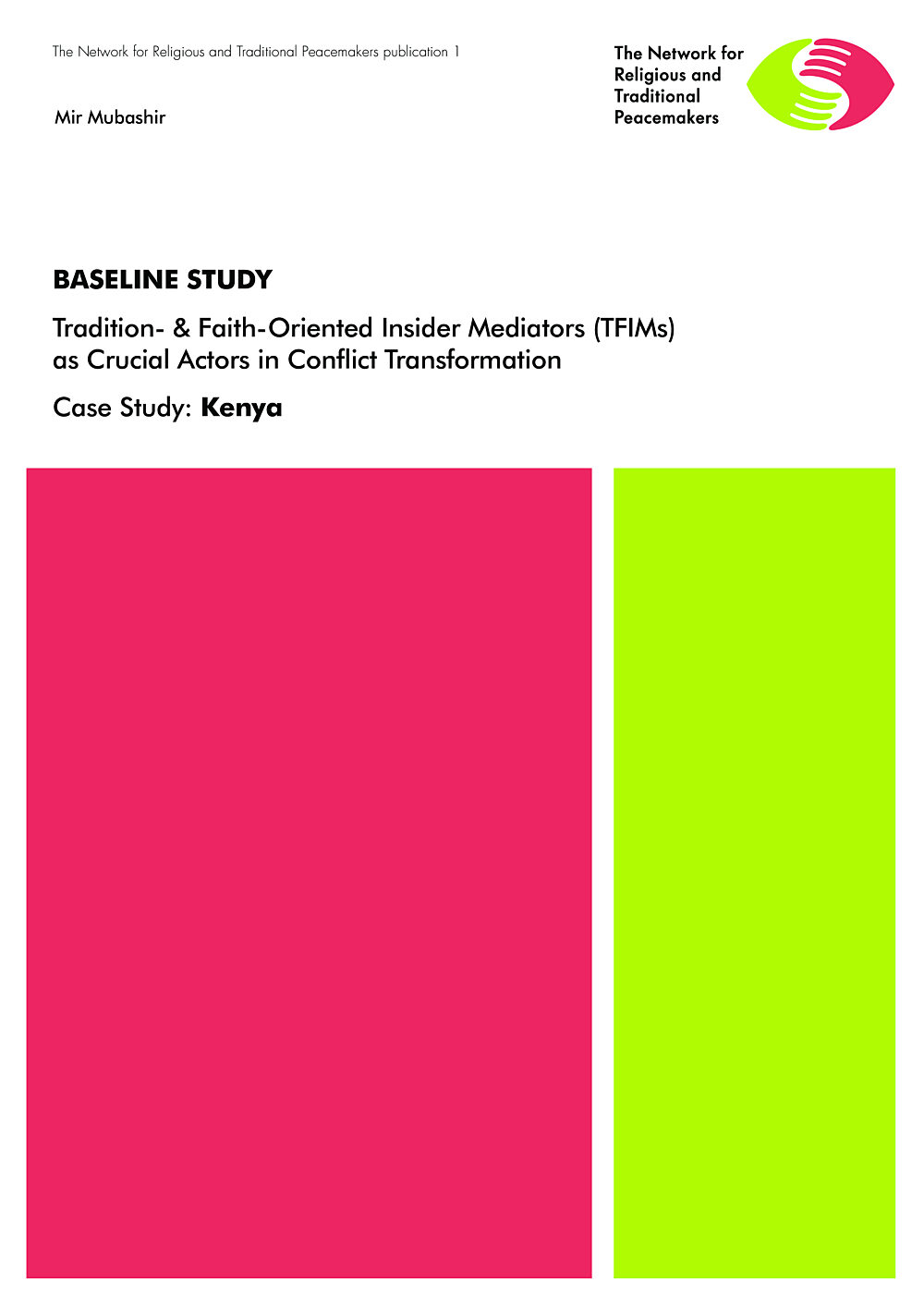
Tradition- & Faith-Oriented Insider Mediators (TFIMs) as Crucial Actors in Conflict TransformationCase Study: Kenya
This case study on tradition- and faith- oriented insider mediators (TFIMs) in Kenya has been produced using both existing knowledge on insider mediators and tradition- and faith-oriented local peacebuilding, and original data acquired through field studies.
- Year2016
- Author(s)Mir Mubashir
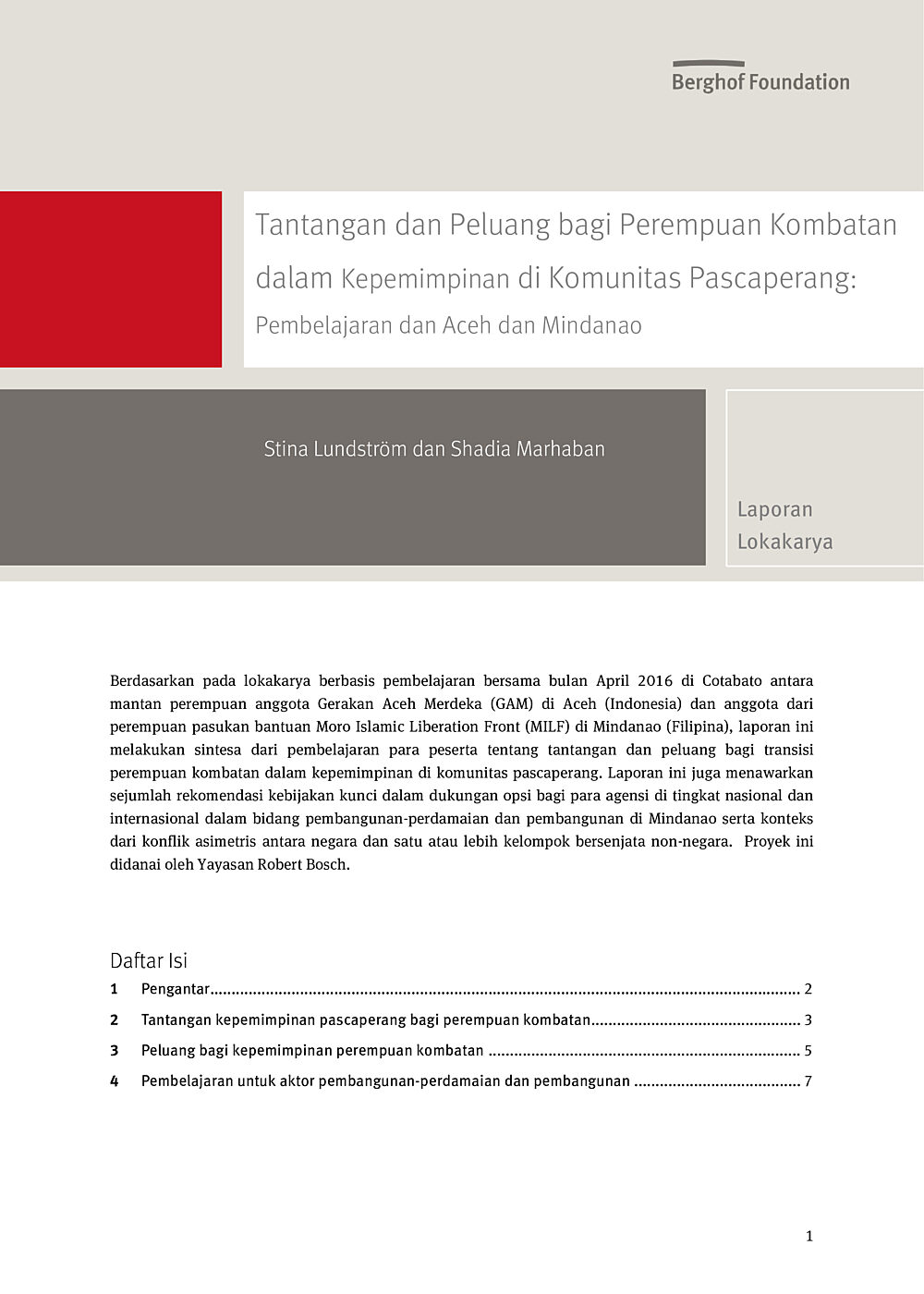
Tantangan dan Peluang bagi Perempuan Kombatan dalam Kepemimpinan di Komunitas PascaperangPembelajaran dan Aceh dan Mindanao (Laporan Lokakarya)
Berdasarkan pada lokakarya berbasis pembelajaran bersama bulan April 2016 di Cotabato antara mantan perempuan anggota Gerakan Aceh Merdeka (GAM) di Aceh (Indonesia) dan anggota dari perempuan pasukan bantuan Moro Islamic Liberation Front (MILF) di Mindanao (Filipina), laporan ini melakukan sintesa dari pembelajaran para peserta tentang tantangan dan peluang bagi transisi perempuan kombatan dalam kepemimpinan di komunitas pascaperang. Laporan ini juga menawarkan sejumlah rekomendasi kebijakan kunci dalam dukungan opsi bagi para agensi di tingkat nasional dan internasional dalam bidang pembangunan-perdamaian dan pembangunan di Mindanao serta konteks dari konflik asimetris antara negara dan satu atau lebih kelompok bersenjata non-negara.
- Year2016
- Author(s)Stina Lundström, Shadia Marhaban
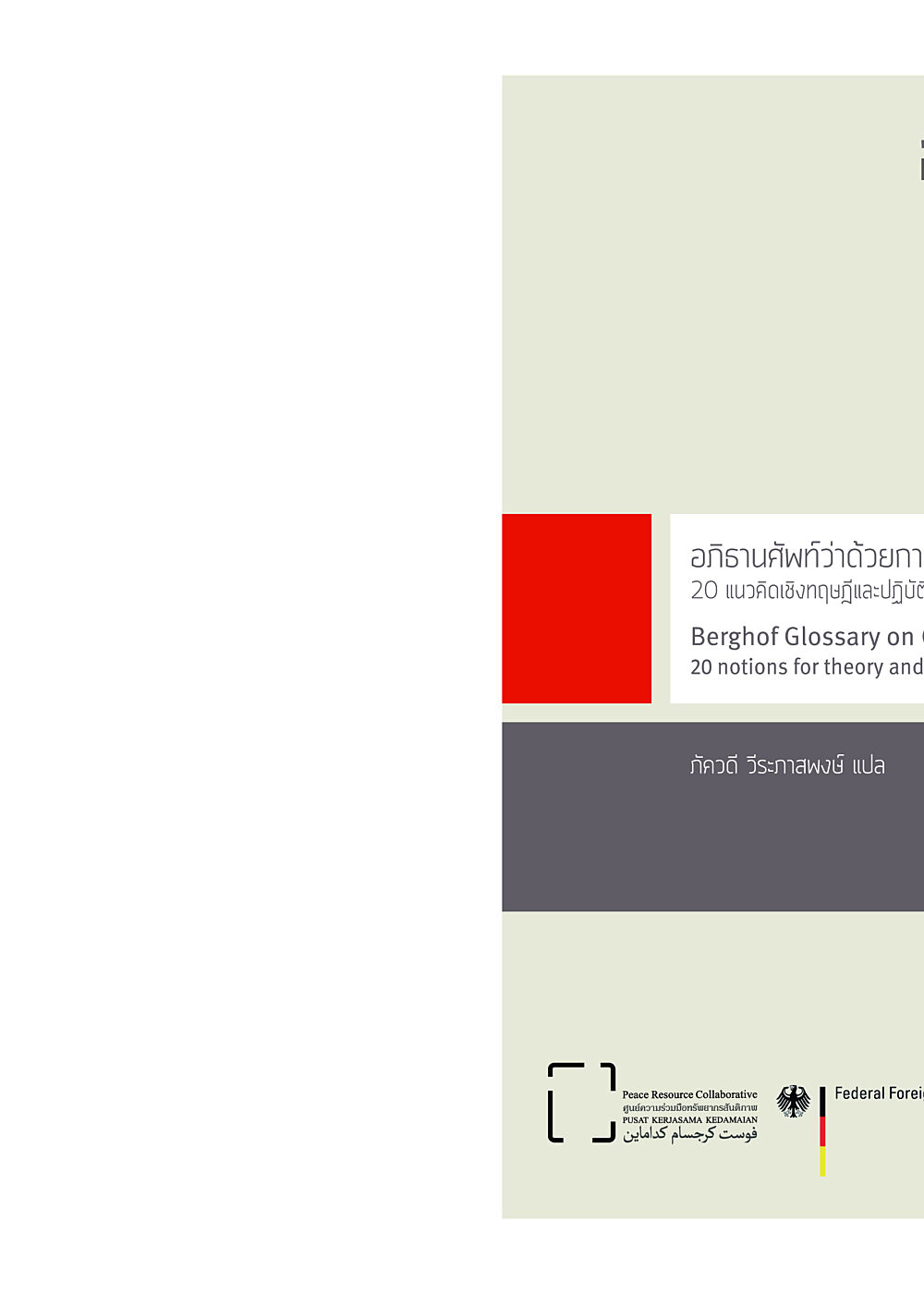
อภิธานศัพท์ว่าด้วยการแปรเปลี่ยนความขัดแย้ง20 แนวคิดเชิงทฤษฎีและปฏิบัติ
หนังสืออภิธานศัพท์เล่มนี้นิยามและอภิปรายถึงค�ำศัพท์ส�ำคัญ 20 ค�ำ ที่เกี่ยวข้องกับการแปรเปลี่ยนความขัดแย้งในการท�ำงานของมูลนิธิ Berghof ท�ำไมจึงต้องจัดท�ำอภิธานศัพท์อีกเล่มและท�ำไมต้องจ�ำเพาะ เจาะจงเป็นอภิธานศัพท์ว่าด้วยการแปรเปลี่ยนความขัดแย้งด้วย? ประการแรก กรอบความคิดเกี่ยวกับ “การแปรเปลี่ยนความขัดแย้ง” เป็นแนวทางที่ค่อนข้างใหม่และมีความแตกต่างชัดเจนในวาทกรรม ระดับโลกเกี่ยวกับความขัดแย้งและกระบวนการสร้างสันติภาพ การ แปรเปลี่ยนความขัดแย้งมีทัศนะว่าการด�ำรงอยู่ของความขัดแย้งเป็น ส่วนที่มีคุณค่าและขาดไม่ได้ในการเปลี่ยนแปลงและการพัฒนาสังคม แต่ไม่ได้มองว่าความรุนแรงเป็นสิ่งที่หลีกเลี่ยงไม่ได้ในความสัมพันธ์ และปฏิสัมพันธ์ระหว่างฝ่ายขัดแย้ง ด้วยเหตุนี้เอง แนวทางนี้จึงไม่ได้ มองว่า “การคลี่คลาย” ความขัดแย้งเป็นเป้าหมายส�ำคัญที่สุดหรือ สูงสุดของภารกิจ ตรงกันข้าม แนวทางนี้มีเป้าหมายที่จะวางรากฐาน ความสัมพันธ์เชิงสร้างสรรค์ระหว่างตัวแสดงที่ขัดแย้งกัน และช่วยวาง โครงสร้างที่จ�ำเป็นส�ำหรับสันติภาพที่ยืนยาว วิธีการที่ใช้คือการโน้มน�ำ สาเหตุที่เป็นรากเหง้าของความขัดแย้งไปในทิศทางที่ยุทธศาสตร์ การไม่ใช้ความรุนแรงสามารถจัดการปัญหาได้ส�ำเร็จอย่างยั่งยืน
- Year2016
- Author(s)Berghof Foundation
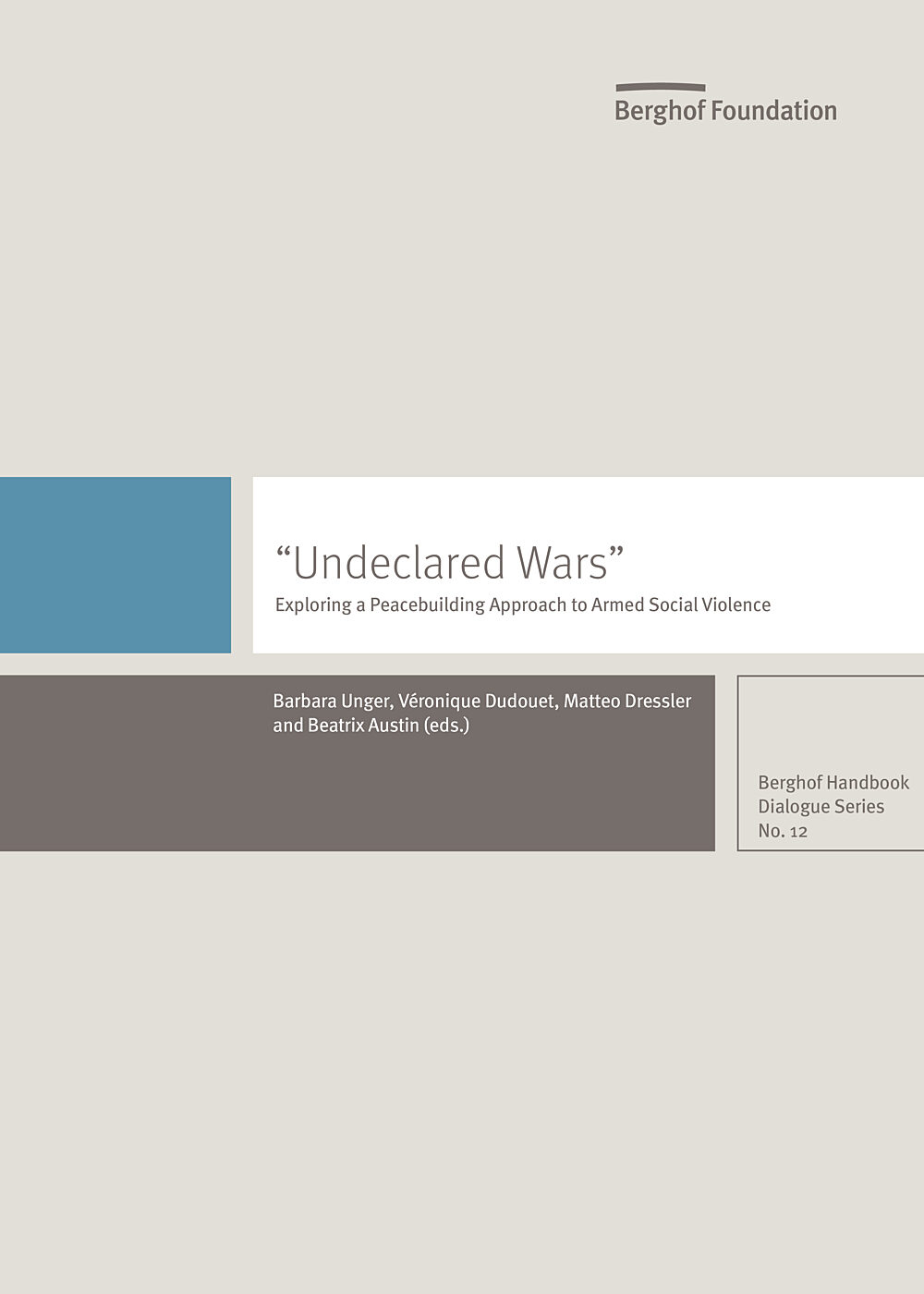
“Undeclared Wars”– Exploring a Peacebuilding Approach to Armed Social ViolenceHandbook Dialogue Series No. 12 - complete
In some countries, more civilians are being killed by armed gangs and criminal organisations than in traditional combat. Still, these pockets of armed social violence – "undeclared wars" marked, among other things, by criminal, gang and/or urban violence as well as extremist violence – have long received much less attention than politically motivated forms of armed conflicts. As their effects — social-political destabilisation, in some cases coinciding with high numbers of victims — are becoming more pressing, national and international actors have begun addressing the phenomenon.
- Year2016
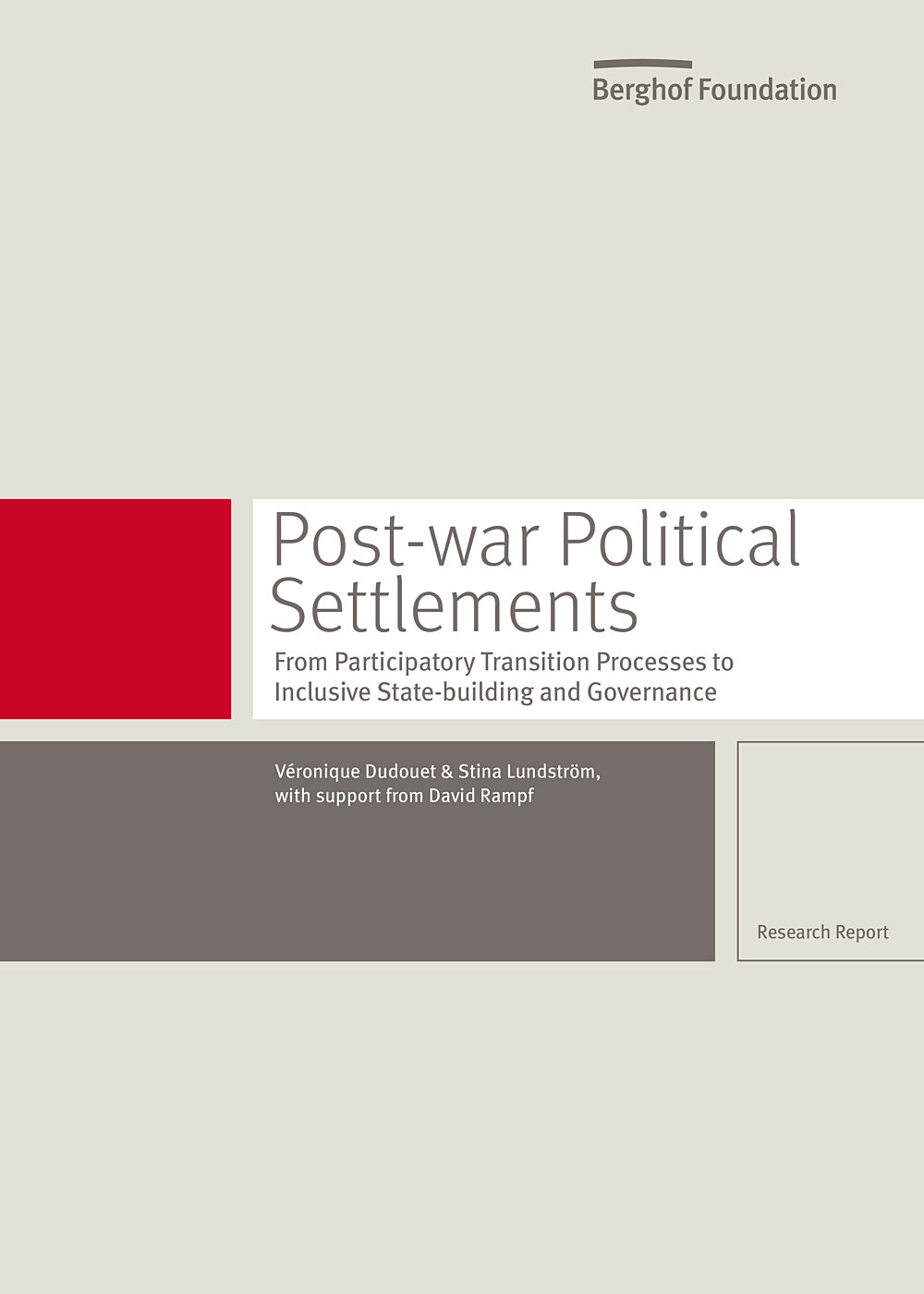
Post-war Political SettlementsFrom Participatory Transition Processes to Inclusive State-building and Governance
The last decade has seen a growing convergence of policy and research discourses among development, peace and conflict, and democratisation experts, with regards to the assumed benefits of inclusive transition processes from conflict and fragility to peace and resilience. The realisation that the social, economic or political exclusion of large segments of society is a key driver of intra-state wars has prompted donor agencies, diplomats and peacebuilding practitioners, as well as the respective academic communities, to search for the right formula to support inclusive and participatory conflict transformation mechanisms and post-war state-society relations. While these various stakeholders profess rhetorical commitment to inclusivity, the term is used in very different and sometimes even in contradictory ways. There are profound disagreements on who should be included in peace processes and political transitions, at what stage and to what end.
- Year2016
- Author(s)Véronique Dudouet, Stina Lundström
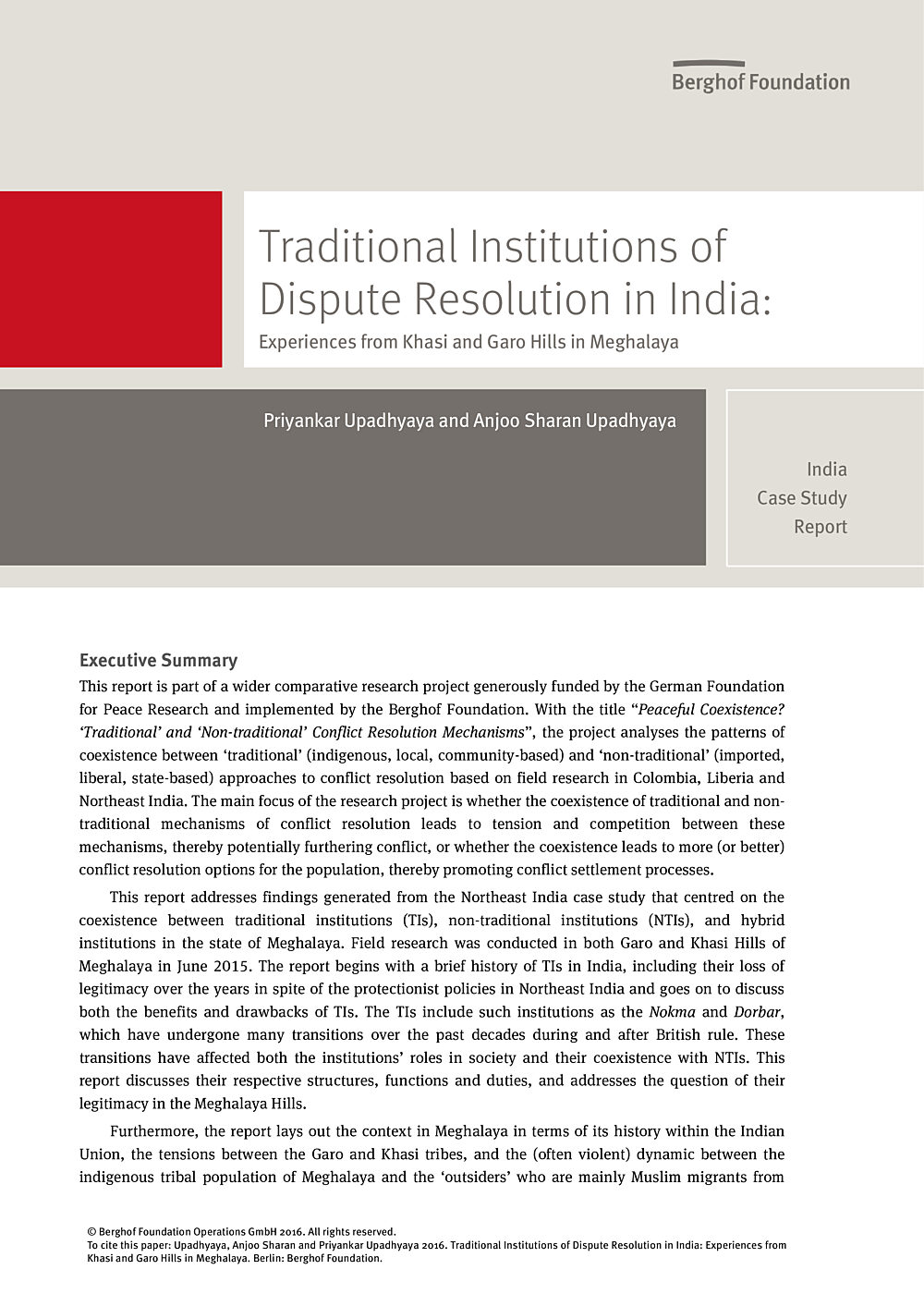
Traditional Institutions of Dispute Resolution in IndiaExperiences from Khasi and Garo Hills in Meghalaya (Case Study)
This report is part of a wider comparative research project generously funded by the German Foundation for Peace Research and implemented by the Berghof Foundation. With the title “Peaceful Coexistence? ‘Traditional’ and ‘Non-traditional’ Conflict Resolution Mechanisms”, the project analyses the patterns of coexistence between ‘traditional’ (indigenous, local, community-based) and ‘non-traditional’ (imported, liberal, state-based) approaches to conflict resolution based on field research in Colombia, Liberia and Northeast India. The main focus of the research project is whether the coexistence of traditional and non-traditional mechanisms of conflict resolution leads to tension and competition between these mechanisms, thereby potentially furthering conflict, or whether the coexistence leads to more (or better) conflict resolution options for the population, thereby promoting conflict settlement processes.
- Year2016
- Author(s)Priyankar Upadhyaya, Anjoo Sharan Upadhyaya
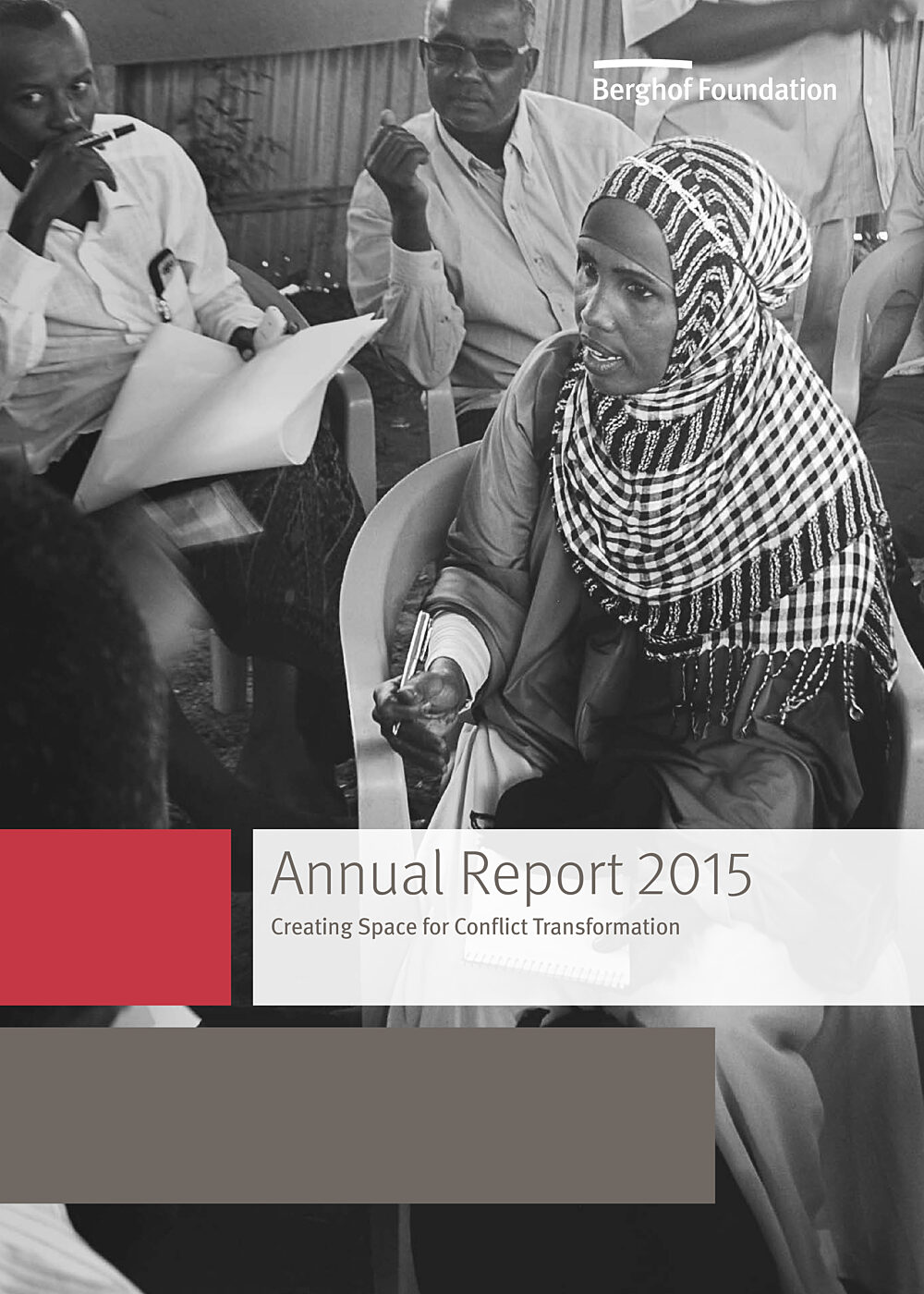
Berghof Foundation Annual Report 2015
Our 2015 annual report lays out some of the activities implemented by our organisation and highlights key achievements of our work over the past year. It illustrates the manifold approaches that we employ as we support our partners in their efforts to transform violent conflicts and engage in cooperation towards peace.
- Year2016
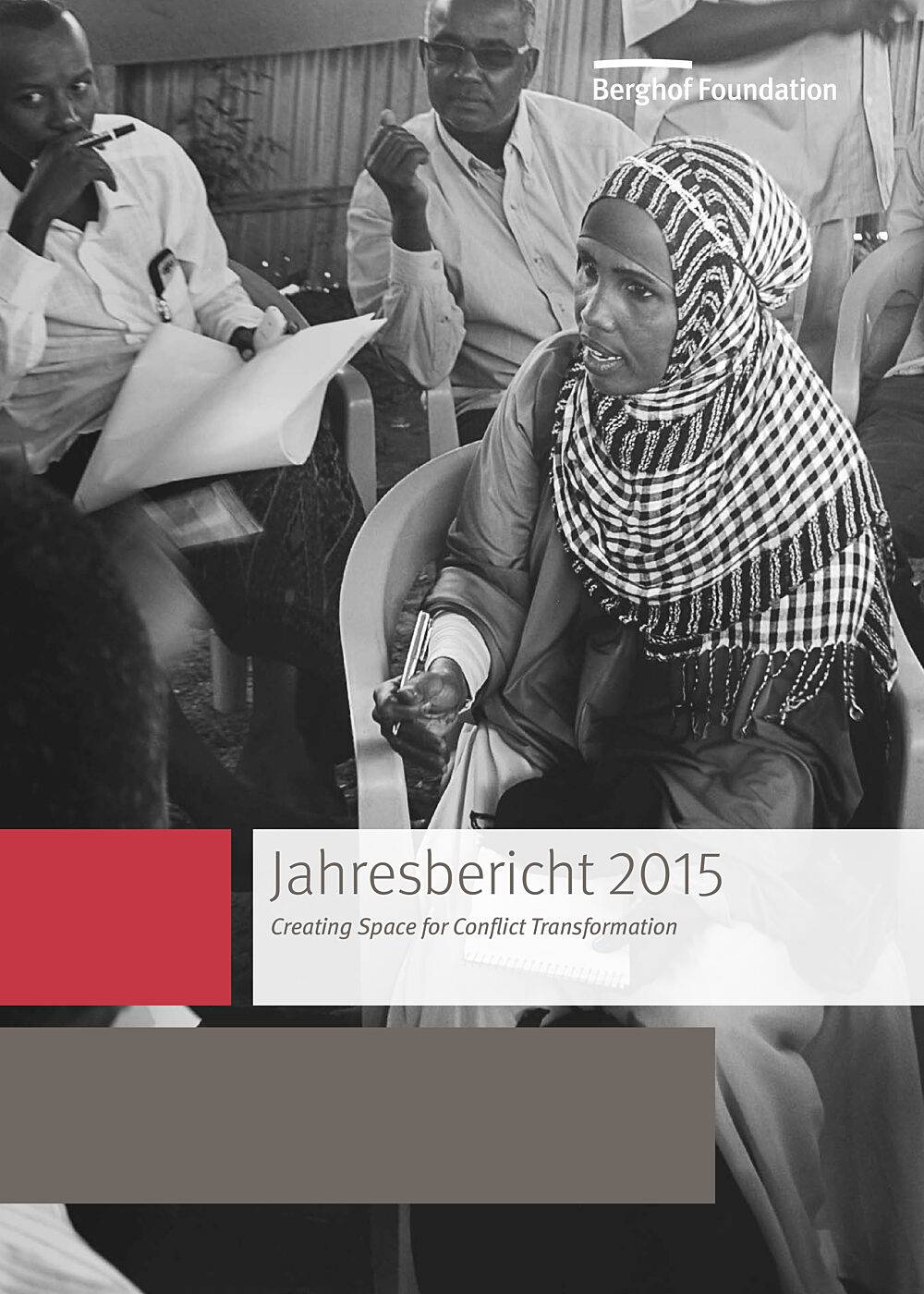
Berghof Foundation Jahresbericht 2015
Unser Jahresbericht 2015 informiert über einige Aktivitäten und Höhepunkte unserer Arbeit. Er gibt einen Einblick in die von uns unternommenen Anstrengungen, unsere Partner in aller Welt in deren Bemühungen bei der Überwindung von Gewalt und für den Frieden zu unterstützen.
- Year2016